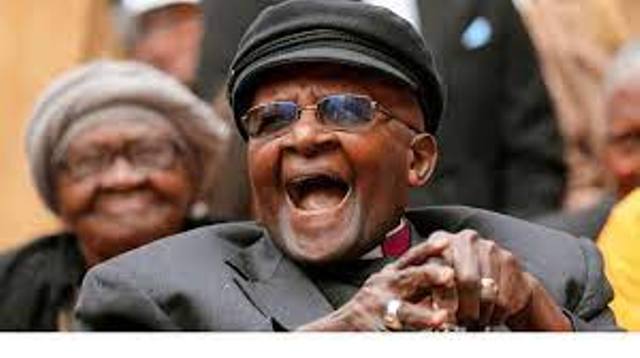JOHANNESBURG (TIP): Indian-origin South African leaders on Monday, December 27, recalled the role of Archbishop Emeritus Desmond Tutu in the liberation and reconstruction of South Africa as they mourned the demise of the anti-apartheid icon, saying he was an “international voice of moral conscience”. Tutu, who won the Nobel Peace Prize for fighting racial segregation and discrimination enforced by the white minority government against the black majority in South Africa, died on Sunday. He was 90. His funeral service will be held at 10 am on January 1 at St George’s Cathedral in central Cape Town, Archbishop Thabo Makgoba said.
Paying his tribute to Tutu, Ahmed Kathrada Foundation Executive Director Neeshan Balton said he was “a national as well as an international voice of moral conscience”.
The Ahmed Kathrada Foundation was formed by late freedom fighter and Indian-origin anti-apartheid activist Ahmed Kathrada who spent just one year less than Nelson Mandela’s 27 years in prison.
Balton said both Kathrada and Mandela had expressed “concerns at the levels of poverty, inequality and deprivation among our people. “Both were outraged at the level of corruption within the government, particularly during the (Jacob) Zuma era, and unhesitatingly expressed their views publicly against state capture and moral decay in society.”Balton said both the leaders shared a deep desire for the attainment of truly non-racial, just and equal South Africa. “While Tutu never wavered on principle, he was ever-ready to forgive his adversaries. The Archbishop Emeritus was a unique figure in the liberation and reconstruction of South Africa and will be sorely missed by millions across the globe,” he said. Anti-apartheid activist and former president of South Africa’s Olympic Committee Sam Ramsamy recalled how Tutu had played a key role in calming the situation after violence erupted following South Africa’s decision to participate in the 1992 Barcelona Olympics.
The incident happened two years after Mandela was freed from prison and as many years before he became the first democratically elected president of South Africa in 1994.
“A bloody and horrible massacre was committed in (the Black township of) Boipatong by some so-called supporters of the Inkatha Freedom Party, killing 45 people with many more injured. There were then calls for South Africa’s withdrawal from the Olympics. Archbishop Tutu helped calm the situation. And South Africa’s first non-racial team took part in Barcelona, bringing back two silver medals,” Ramsamy recalled.
“Archbishop Tutu’s support for Olympics never faded. He was part of South Africa’s delegation for the 1996 Atlanta Olympic Games. In 2002, he was a member of the elite group that carried the Olympic Flag in the Opening Ceremony of the Salt Lake City Games. He loved being present at major sports events,” he said.
Internationally renowned film producer Anant Singh recalled a three-decade family friendship with Tutu and the Archbishop Emeritus’s support for his ventures.
“I was fortunate to have him as our guest of honor when we opened our cinemas in Cape Town 21 years ago, and when we made our film, ‘Red Dust’, he provided us his invaluable advice,” Anant said.
The theme of the film was the Truth and Reconciliation Commission, to which Mandela had appointed Tutu as Chairperson.
Tutu once broke down in tears at the Commission while victims of apartheid were recalling the atrocities committed on them by the violent apartheid-era security forces.
“I was honored to have been a fellow award recipient together with the Arch from the New York-based social investment fund, ‘Shared Interest’ in 2014,” Singh said.
Cricket South Africa (CSA) also condoled the death of Tutu.
“Cricket benefitted immensely from his heroic efforts, as it ushered in a new era of unity, embodying God’s rainbow people,” the CSA said in a statement, noting that Tutu had passed away on the very day that South Africa and India commenced a Test series marking the 30th Anniversary of South Africa’s readmission into international cricket after decades of isolation from international participation due to apartheid.
“This makes the Archbishop’s passing a very painful loss to CSA, as his activism and teachings helped in transforming the sport of cricket. CSA is delighted that the Archbishop was an avid cricket fan,” CSA Acting Chief Executive Officer Pholetsi Moseki said. “There are just a handful of people who have made a greater contribution to our democracy, and the unification of sport and in particular cricket in South Africa than our beloved and much respected Archbishop Emeritus Desmond Tutu,” he said. Meanwhile, a series of services and other events have been planned across South Africa in the week-long mourning period.
Tutu’s body will lie in state in St George’s Cathedral on Friday.
Archbishop Makgoba appealed to mourners not to make their way to Cape Town, but rather join the services of their local institutions, as only 100 people would be allowed at the funeral due to the Covid-19 lockdown restrictions. Starting Monday, the bells at St George’s Cathedral will toll for 10 minutes at noon daily till the funeral. Makgoba asked all who hear the bells to pause their activities for a moment in tribute to Tutu.
